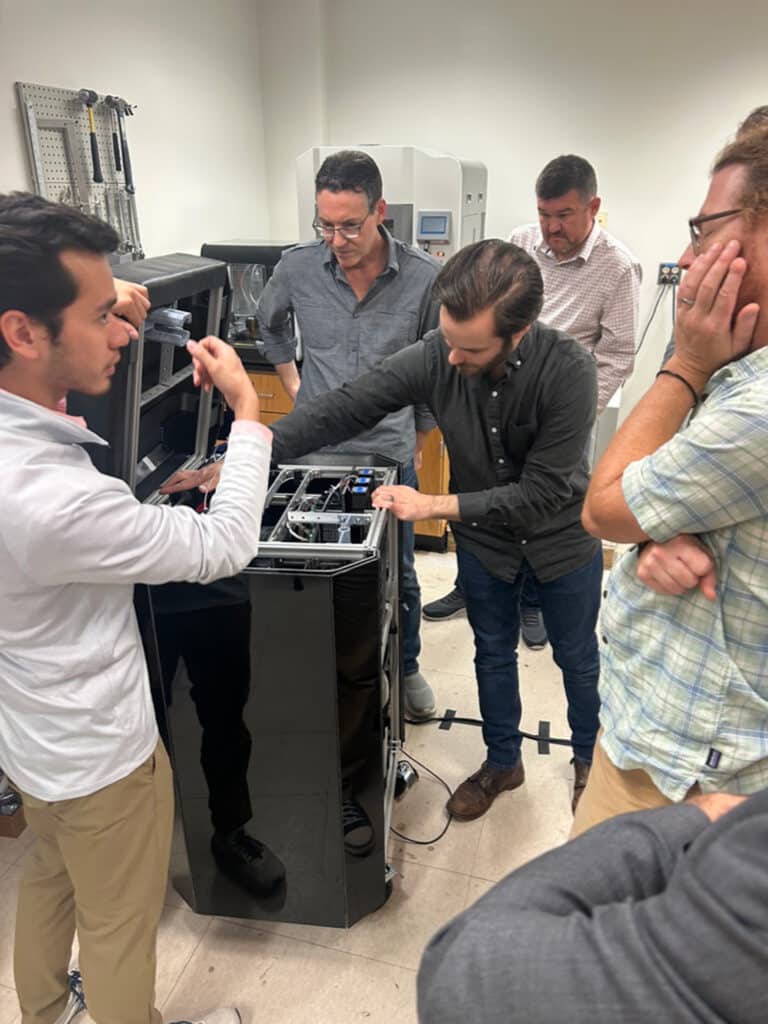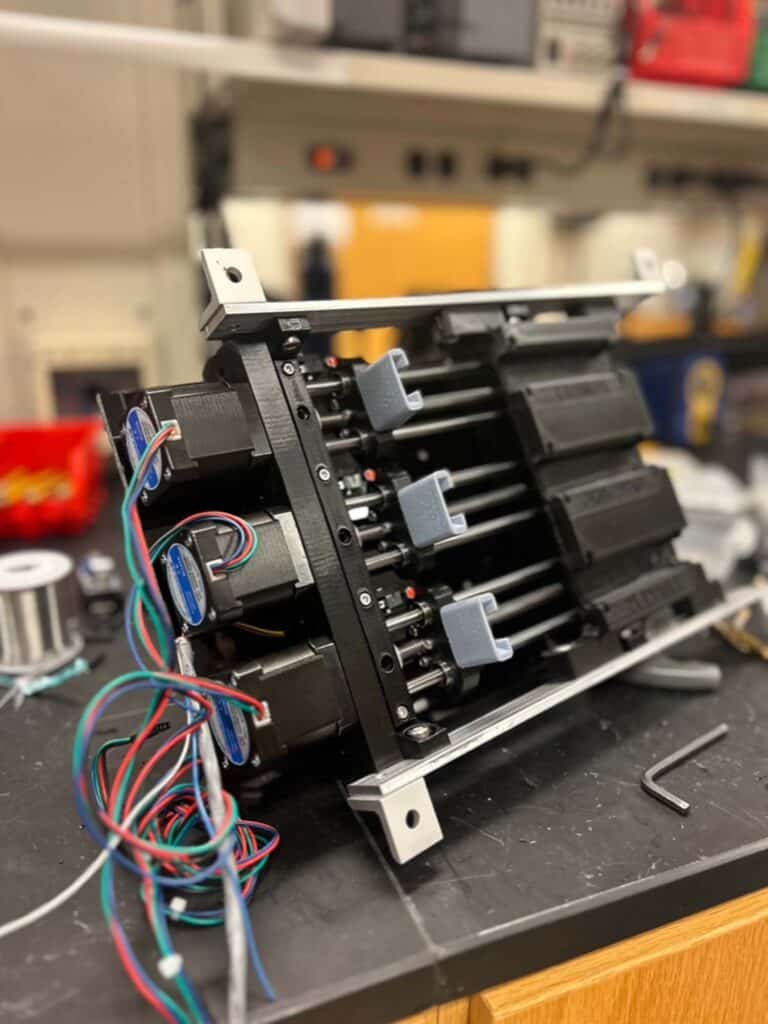From the Lab to the Market: Commercializing Chemistry Research
With the help of NC State’s Office of Research Commercialization, College of Sciences faculty are ushering their innovations into the marketplace.

NC State faculty and students spearhead solutions to make the world a safer and healthier place. College of Sciences faculty are developing a new generation of antibiotics, creating antimicrobial surfaces, improving medical diagnostic devices and more. A few of them are taking the leap and ushering their discoveries from their labs out into the marketplace.
NC State’s Office of Research Commercialization (ORC) has helped launch more than 200 startups and spinoffs based on NC State research. These ventures don’t only speak to the Wolfpack spirit of innovation; they contribute to the social, economic and technological development of North Carolina and the world.
We spoke to the faculty behind three of these startups to discuss how they’re using molecular solutions to address society’s most pressing challenges.
PhotoCide Protection: A Surface-level Solution to the Spread of Disease
Whenever you touch a surface — whether it be a doorknob, a pole on a city subway or a bed rail at a hospital — you come into contact with millions of disease-spreading bacteria, viruses and molds. Reza Ghiladi, a professor of chemistry, and Frank Scholle, a professor of biological sciences, are working to change that. Their startup, PhotoCide Protection, focuses on developing self-disinfecting materials and antimicrobial coating solutions for high-touch surfaces.
The idea first came to Ghiladi in 2010, when he found himself spending a lot of time in the hospital after the birth of his twin sons.
“They spent nine weeks in the NICU,” said Ghiladi, referring to the hospital’s neonatal intensive care unit. “They underwent blue light therapy to cure jaundice, and the idea of using blue light therapy to activate compounds in order to create antimicrobial surfaces came to mind.”
Self-disinfecting Bandages
In 2022, PhotoCide received funding from the Army to develop self-disinfecting wound bandages.
Spray Solutions for Pets
Ghiladi, Scholle and the College of Veterinary Medicine are creating spray solutions to treat skin infections on pets.
Targeting High-touch Surfaces
PhotoCide is making self-adhesive tape with antimicrobial action that can be used on high-touch surfaces.
Ghiladi and Scholle combine engineered materials with photosensitizers, or compounds that react with ambient light and oxygen from the air. In this case, the reaction emits biocidal oxygen, which destroys 99.99% of the harmful pathogens on surfaces.
The two professors, along with Dimitris Argyropoulos, professor emeritus in the College of Natural Resources, founded the startup in 2018 with the help of ORC. The office helped them file invention disclosures and provisional patents and invited them to participate in NC State’s I-Corps site, a National Science Foundation-funded initiative to help researchers assess their products’ market potential. Through I-Corps, they learned more about entrepreneurship and met Robert Sheehan, a retired executive who joined PhotoCide as the director of business and commercialization.
“ORC does a really good job of trying to bridge any of the gaps that we may come across or provide us with alternative routes.”
The PhotoCide team has also been able to tap into the rest of ORC’s suite of resources and connections.
“They have built a tremendous network in the area. They put us in touch with First Flight Venture Center, and we were able to secure some funding from them,” said Scholle. “They have the Executive-in-Residence program, which connects you with local executives and entrepreneurs. There’s also the Wolfpack Investor Network.”
Ghiladi and Scholle also appreciate the unique flexibility that ORC provides for faculty startup founders.
“They understand that it’s not a direct line from idea to sales,” said Ghiladi. “There are lots of pitfalls and lots of challenges, and ORC does a really good job of trying to bridge any of the gaps that we may come across or provide us with alternative routes.”
ORC has helped Ghiladi and Scholle get closer to their goal of preventing the spread of infectious diseases, but their primary responsibility remains to their students. Whenever possible — and abiding by NC State’s conflict of interest policies — Ghiladi and Scholle give graduate students an opportunity to work with PhotoCide.
“If I bring in a student, I want there to be an intellectual challenge for them, and that usually comes from delving into the more fundamental research side of things,” said Scholle. “I don’t want their experience to simply be running assays to test the efficacy of what we have already developed.”
“It’d be nice to walk into a CVS one day and see one of our products, but our number one accomplishment is our students.”
The company’s work provides students with a unique opportunity to see the connections among fundamental research, applied research and commercialization. The research has a clear application – the development of antimicrobial surfaces that prevent infections — but the company has to look to the market to determine which products are most useful. Then, they go back to fundamental research, studying and tuning the interactions between pathogens and the engineered materials at the molecular level to create the desired product.
Ghiladi and Scholle are hopeful for the future of PhotoCide, but their best work lies in the mentorship and practical experience they’re providing for their students.
“It’d be nice to walk into a CVS one day and see one of our products, but our number one accomplishment is our students,” said Ghiladi. “We’re training the next generation of scientists and entrepreneurs to go into the community and do wonderful things.”
Synoxa Sciences: Developing Antiobiotics for Drug-resistant Infections
Tens of thousands of people in the U.S. die each year from drug-resistant bacteria. Without the development of new antibiotics, such deaths are projected to exceed cancer death rates by 2050. Joshua Pierce, the Howard J. Schaeffer Distinguished Professor of Chemistry and executive director of the Integrative Sciences Initiative, is determined to change this trajectory.
Pierce founded Synoxa Sciences in 2018 with the goal of developing the next generation of antibiotics to fight drug-resistant infections.
“Synoxa isn’t alone in this pursuit. There are many efforts along those lines, but the reality is that we don’t just need one new antibiotic,” said Pierce. “We need as many of them as we can possibly get. We need to have a whole arsenal to refill the one we once had against these fairly common infections.”
“All the research that led to the startup was done by NC State graduate students.”
Pierce’s research approach involves developing new chemical reactions to scale up molecules made from natural organisms — either marine or terrestrial — that are made in very small quantities by the natural systems. These natural compounds, along with modified molecules, are then evaluated for their ability to be developed for human health-related applications.
“Ultimately, we try to get these molecules on a path that could turn them into pharmaceutical agents,” said Pierce. “But that’s a long, extremely expensive, and sometimes meandering, process.”
When Pierce and his students obtained the results that led to the creation of Synoxa, ORC stepped in to help launch the startup.
“All the research that led to the startup was done by NC State graduate students,” said Pierce. “There were a number of them, and their names are on some of the patents we got.”
ORC not only helped with filing patents, but also with the legal components and fees related to setting up the entity. The office provided assistance with developing Synoxa’s business plan, website and logo, and helped with the initial grant submissions to support the company’s work.
“ORC is able to provide a portfolio of services that can help make things easier to get started,” said Pierce.
“ORC is probably our best office on campus in terms of providing useful, helpful and constructive support.”
Now, Pierce is focused on taking Synoxa to the next level. The company has already received two competitive Small Business Technology Transfer (STTR) grants from the National Institutes of Health totaling $1.2 million. Pierce and his team hope to earn STTR Phase II grants and bring in potential investors.
Drug discovery is a tough and costly process. Antibiotic development, specifically, can be difficult to fund. But NC State’s support has made a difference for Synoxa.
“NC State is super supportive of entrepreneurial efforts. They do everything within their power to promote and support these things,” said Pierce. “I routinely say that ORC is probably our best office on campus in terms of providing useful, helpful and constructive support.”
Vizma: Transforming the Future of Medical Imaging
Thomas Theis, associate professor and Goodnight Distinguished Scholar in Molecular Characterization in the Department of Chemistry, arrived at NC State with a mission to advance fundamental quantum chemistry. He’s making his mark with Vizma, a startup he co-founded to develop medical imaging technology that is more precise and more cost effective.
Magnetic resonance imaging (MRI) and nuclear magnetic resonance technology use strong magnetic fields to align the atoms in a patient’s body. However, the technology is only able to detect about one in 100,000 of the atoms’ nuclear spins, resulting in limited sensitivity and resolution. Through hyperpolarization chemistry, Theis and the rest of the Vizma team are developing quantum-enhanced MRI technology that aligns all of the nuclear spins with the magnetic field.
“This results in much, much higher sensitivity, meaning we can now detect molecules at very low concentrations,” said Theis. “Usually, an MRI only looks at water molecules. But with hyperpolarization, you can actually look at molecules that are present at very low concentrations, like vitamins, drugs or metabolites. So you can watch the chemistry unfold.”
The emerging hyperpolarized MRI leads to increased precision of medical imaging, which means earlier detection of cancers and other diseases involving dysregulated metabolisms, including cardiovascular, kidney and liver disease. Hyperpolarized MRI has even been used to more quickly assess the effectiveness of breast cancer treatments in patients, delivering vital answers to medical professionals in days rather than months.
Vizma’s goal is to sell devices and consumables that medical professionals can use to prepare injectable MRI contrast agents. These injectables can be used alongside existing MRI instruments to produce higher quality MRI scans. Although such technologies already exist, Vizma’s innovations could lead to significant reductions in their cost. Furthermore, Theis envisions a future where Vizma’s devices are combined with next-generation MRI scanners that are more affordable.
“Given that these technologies already exist, it is easy to imagine them becoming ubiquitous in health care,” said Theis.
The idea for Vizma originated nearly a decade ago, when Theis met Carlos Dedesma, who has recently become the startup’s full-time CEO. Dedesma is a serial entrepreneur with expertise in commercializing novel healthcare technologies. He has led commercialization efforts at Hyperfine — which markets portable MRI scanners — as well as strategy and partnerships at Verily, the life sciences research arm of Alphabet, Google’s parent company. Theis and Dedesma’s mutual excitement about the clinical impacts hyperpolarization could have on medical imaging led them to co-found Vizma in 2019, one year after Theis started his faculty appointment at NC State.
“ORC at NC State has been an invaluable partner in getting Vizma off the ground,” said Theis.
In the initial stages, ORC helped with the process of filing invention disclosures and patents — Theis has obtained five patents with the office’s help. ORC also assisted with negotiating intellectual property and licenses, and even pointed Theis and his partners at Vizma to local law firms to help with the legal components of the business.
“Coming to NC State, one of the things I really loved is how active, encouraging and professional the staff is at ORC. They helped [Dedesma] and I incorporate the company,” said Theis. “They showed us the ropes of how to do this. I would say NC State’s ORC is really one of the best I can imagine.”
Theis’ own entrepreneurial journey has inspired him to help others achieve their own commercialization aspirations. As the director of entrepreneurship at NC State’s Comparative Medicine Institute (CMI), Theis runs two annual programs, Catalyze and Business and Medicine. Catalyze gives graduate students and postdoctoral researchers the opportunity to pitch startups, network with industry professionals and compete for funding to jumpstart their ideas. Business and Medicine pairs CMI students with students in the Master of Microbial Biotechnology program, and they receive training in both the science and business of biotechnology.
“I’m trying to encourage students, postdocs, other labs and other professors to think about avenues in entrepreneurship and convert their ideas into new products and startup companies,” said Theis. “I find it very rewarding.”




